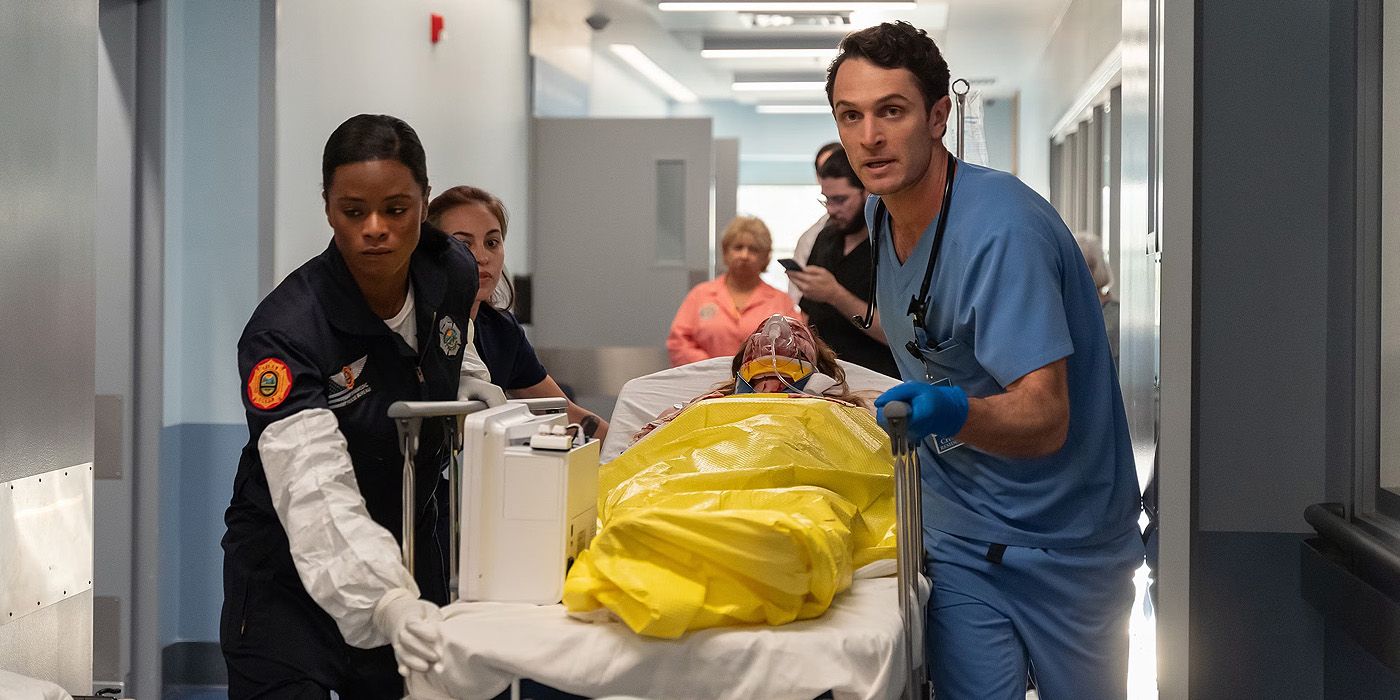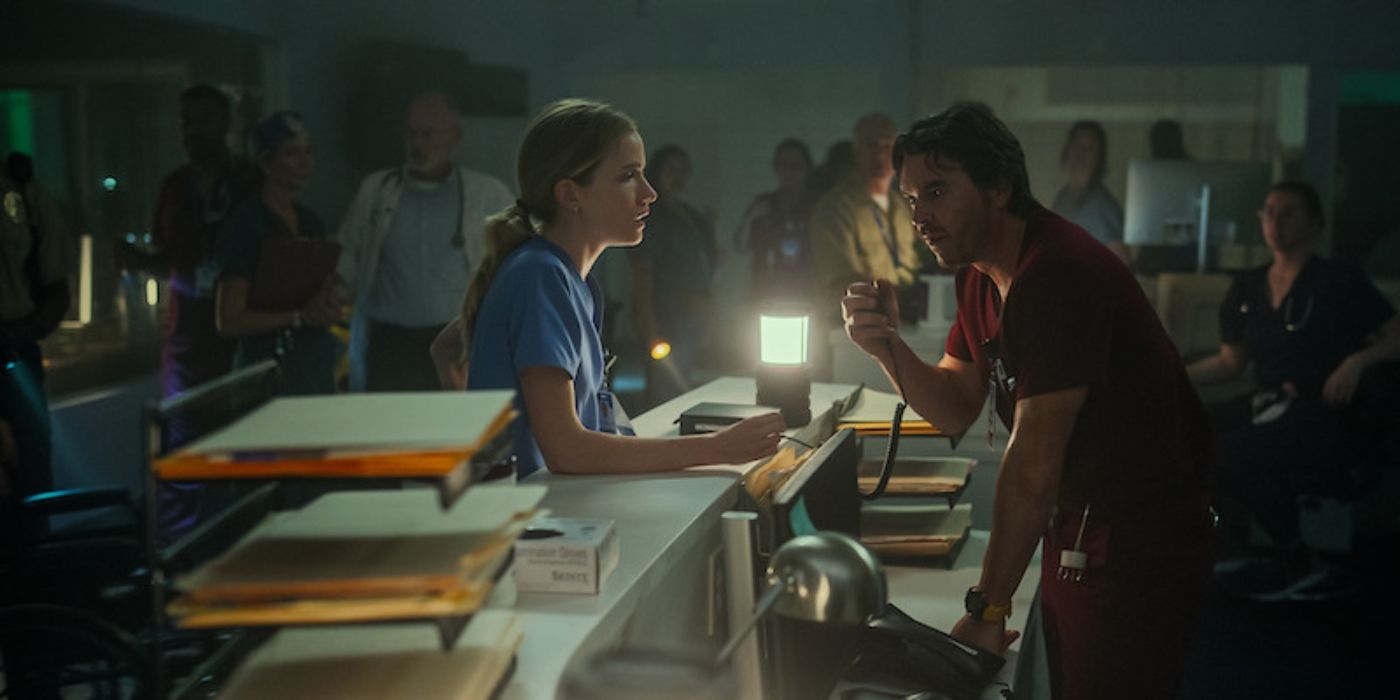
In a fresh twist to the medical drama genre, Netflix introduces “Pulse,” a new series that premiered on April 3, joining heavyweights like “Grey’s Anatomy” and “The Pitt.” However, unlike its predecessors, “Pulse” presents a storyline that some might argue was unnecessary. The series revolves around third-year resident Dr. Danny Simms (played by Willa Fitzgerald), who reports sexual harassment against her colleague and former lover, Xander (portrayed by Colin Woodell). As they are compelled to collaborate during a natural disaster, the series delves into their complex power dynamics through flashbacks, while also highlighting the challenges that arise from this uncomfortable situation.
Despite the storyline’s promising potential for deeper exploration, surprisingly, Netflix’s medical drama, Pulse, fell short and failed to convey its intended message effectively. If not for the series’ contentious portrayal of a critical issue like sexual misconduct and power abuse, Pulse might have offered some significance or imparted a valuable lesson. Here’s a breakdown (no pun intended) of the problems with Netflix’s medical drama Pulse.
Read Our Review
‘Pulse’ Mishandles #MeToo




At the heart of the series ‘Pulse‘ lies its narrative exploring power dynamics and harassment within the work environment. Nevertheless, the medical drama unintentionally misrepresented the #MeToo movement by presenting an ambiguous portrayal of Danny and Xander’s relationship. Initially, Danny asked Xander to cease flirting and pursuing her; however, later on, their bond developed into a genuine romantic one. Although relationships can evolve from one stage to another, ‘Pulse‘ failed to provide sufficient detail in exploring this narrative development. Consequently, the outcome is perplexing and potentially detrimental to women navigating the workplace.
Beyond this point, it’s worth noting that the timing of Pulse’s release couldn’t have been more unfortunate, as it coincided with the final episode of the critically acclaimed medical drama, The Pitt. The Pitt prides itself on being authentic and true to life, which makes it hard for Netflix’s Pulse to hold its own, as a single glimpse at the show seems to overshadow it immediately. Conversely, the ongoing drama between Danny and Xander in Pulse appears less grounded in reality, giving the impression that crucial parts of their conversations are missing or unclear.
Stereotypes in ‘Pulse’



The show, “Pulse,” lacks a heartbeat from the start, as its success hinges on cardboard characters that are more like lifeless zombies than relatable personalities. The protagonist, Danny, is puzzlingly complex; she’s assertive when the situation calls for it, but her conversations often become confusing and difficult to follow. Her erratic outbursts of anger and cold treatment towards her friends leave viewers struggling to make sense of the show’s narrative. Sam Elijah (Jessie T. Usher), Danny’s friend, is supposed to be in love with her, but his character portrays this affection ambiguously.
Later, we have Tom Cole, portrayed by Jack Bannon, who embodies the quintessential British alpha male with a penchant for money, status, and power, yet has an even stronger affection for women. Unfortunately, he frequently mistreats them and manipulates their emotions. This all changes when he encounters one of his patients, Nia (Ash Santos). Surprisingly, he develops feelings for her. However, even this heartfelt change fails to alter his reckless behavior significantly. Quite unexpectedly, this is a double shocker.
In Pulse, the emphasis on Cole’s unsavory actions makes it seem as though Xander might not be as bad as he appears. Despite allegations of sexual misconduct and misuse of power, Xander is reinstated at work during a hurricane and even allies with Danny. This paradoxical treatment could potentially give the impression that Pulse associates makeup usage with personality traits. Additionally, Camila (Daniela Nieves), a character portrayed as sweet and feminine due to her use of makeup, contrasts sharply with Sophie (Chelsea Muirhead), who is often grumpy and doesn’t wear makeup. This might unintentionally suggest that Pulse views makeup as a defining characteristic of one’s personality. Furthermore, Harper (Jessy Yates) appears to be an intriguing character, but the series fails to delve deeper into her role beyond portraying her as Harper’s sister who uses a wheelchair.
Questionable CGI in the Medical Drama Series




The expectation that the computer-generated imagery (CGI) might rescue the show Pulse, causing viewers to overlook its contentious plotline and dull characters, was shattered in the very first episode itself. Unlike Grey’s Anatomy, which rectified its issues at a later stage, Pulse seemed more like it had taken a detour to an early 2010s video game and desperately attempted to piece something together – unfortunately, this didn’t yield the desired results. [Spoiler Alert] It failed miserably.
In the opening episode, a disastrously poor bus accident scene foreshadows the subpar representation of hurricane sequences and overall operations. If there’s one area where Pulse excels, it’s in demonstrating the wrong ways to employ CGI, develop characters, and address #MeToo issues. You can watch Pulse on Netflix.
Read More
- 10 Most Anticipated Anime of 2025
- Brent Oil Forecast
- USD MXN PREDICTION
- Silver Rate Forecast
- PUBG Mobile heads back to Riyadh for EWC 2025
- Gold Rate Forecast
- Grimguard Tactics tier list – Ranking the main classes
- Pi Network (PI) Price Prediction for 2025
- How to Watch 2025 NBA Draft Live Online Without Cable
- Castle Duels tier list – Best Legendary and Epic cards
2025-04-13 17:02